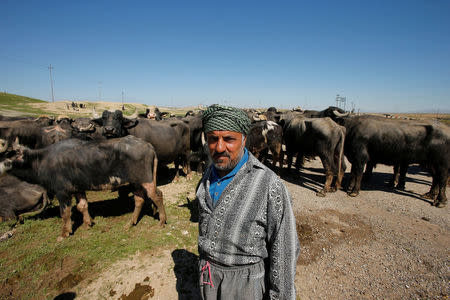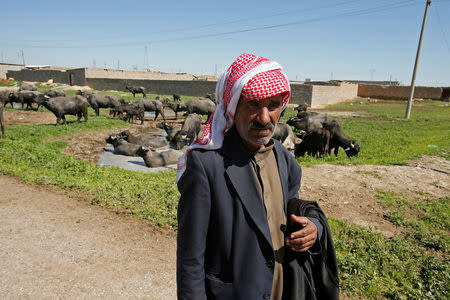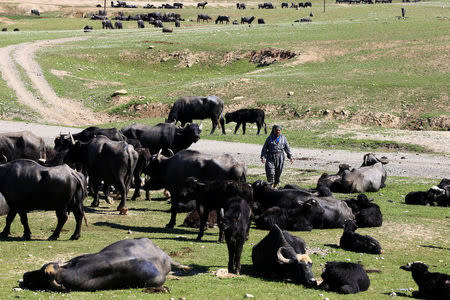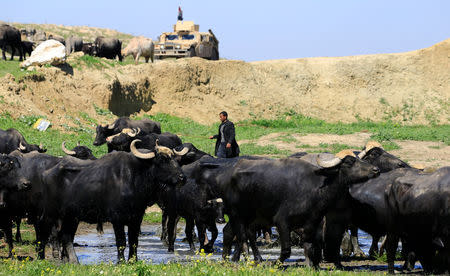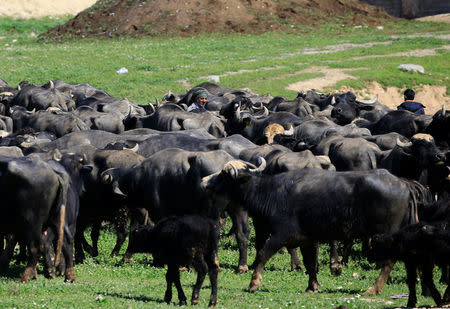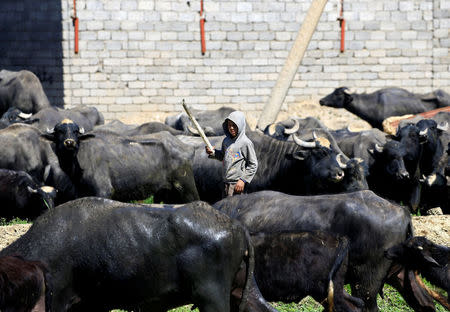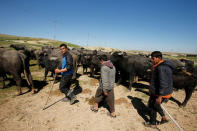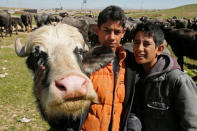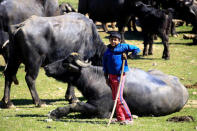Iraqi farmers desperate to go home as cattle perish
By John Davison MOSUL, Iraq (Reuters) - In a field off a main road south of Mosul, a stray dog picked at the body of a dead buffalo calf, part of an exhausted herd brought 20 miles on foot by farmers forced to abandon their land in the fight against Islamic State. The men and their families fled Badush, to the northwest of Mosul, some two weeks ago as the Iraqi army and Shi'ite Muslim paramilitary forces fought Islamic State militants - part of a U.S.-backed offensive to end the jihadists' rule in and around Mosul. The cattle the farmers have managed to salvage and thousands more left in their village untended will soon perish if they do not move home soon, they say. So far, attempts at return have been blocked. Army officials and the Shi'ite forces now in control of Badush say it is not safe for residents to live there. The farmers insist it is, and suspect political motives or sectarian score-settling by Shi'ite militias in an area where the Sunni extremist Islamic State executed hundreds of Shi'ites in 2014. Either way, the effect of war on their livestock, and livelihood, could be equally devastating. "You can see the animals are beginning to starve. There's no proper food for them here and the water they're drinking is dirty. Several of the younger ones have died," farmer Zuheir, 32, said pointing towards the calf's carcass. Several dozen buffalo drank from and bathed in the nearest source of water, a stagnant pool polluted with petrol. The farmers, who had walked across the desert for two days with their herd, were squatting in rural homes abandoned by people who had fled fighting around Mosul. Many others from Badush are living in a crowded displaced people's camp further south. They initially fled leaving all the animals behind as Iraqi forces attacked the village to drive out Islamic State. Since then, a few men have been allowed to collect some of the buffalo, but were only given an hour to do it. "We need two days to round them up properly and make sure we can take care of them," another farmer, Ahmed Ibrahim, 48, said. The more than 10,000 buffalo of Badush were a key source of meat and dairy products in western Mosul. On a recent trip to Badush, Reuters saw some dead buffalo and hundreds more roaming the village. The farmers are relieved to be rid of the ultra-hardline Islamic State, and thankful to the Iraqi forces that have moved in. LONG EXILE FEARED Some fear long-term exile, however, saying Shi'ite forces are blocking their return. "It's revenge on Sunnis. We'll never be able to return. No officials are interested in us and the Hashid Shaabi (Shi'ite forces) wants to keep Badush," Ahmed Taha, a Badush resident living at the camp, said. The Hashid Shaabi denied such intentions. "It's difficult because there are explosives, bombs planted or left by Islamic State," said Karim Nouri of the Hashid. "There needs to be a securing of areas destroyed by the war." Islamic State have left parts of the Badush area booby trapped, including a factory where soldiers accidentally triggered a car bomb on Sunday. But the concerns of the farmers reflect those of many displaced Sunni Arabs in northern Iraq who fear ethnic or sectarian revenge in a country dominated by partisan politics. Many say they have not been allowed home by Kurdish forces, for example, which drove Islamic State from hundreds of villages. Kurds deny preventing Arabs from returning and accuse many Sunni Arabs of siding with Islamic State. Sunnis fear similar action by Shi'ite groups, a charge Shi'ite officials reject. Politics aside, time is running out for the buffalo, another farmer said. "If we don't get back, they'll die." (Editing by Ed Osmond)

 Yahoo News
Yahoo News 